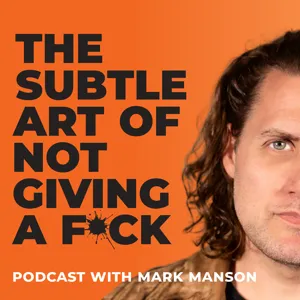Podcast Summary
The Overrated Nature of Money for Happiness: Prioritizing money over relationships and personal growth can lead to unhappiness. Spending money on experiences and enhancing relationships contributes to greater happiness.
Money, while important for happiness due to its ability to provide security and opportunities, becomes overrated when we prioritize it above other aspects of life, such as relationships and personal growth. The pursuit of money and material possessions can actually lead to unhappiness. Instead, spending money on experiences and using it to enhance our relationships and passions can contribute to greater happiness. This aligns with the idea that extrinsic goals, like wealth and fame, are less effective at bringing long-term happiness than intrinsic goals, like personal growth and relationships.
Factors Influencing Happiness: Mindset, Relationships, and Occupation: Money can enhance happiness for those already content, relationships significantly impact overall happiness, and finding meaning in work contributes to long-term happiness.
Our happiness levels are influenced by various factors, including our mindset, relationships, and occupation. Recent research suggests that money can increase happiness for most people, but only if they are already happy. The quality of our relationships, whether romantic or not, plays a significant role in our overall happiness. While specific events, such as marriage or divorce, may bring temporary joy or sorrow, it's the long-term consequences that truly matter. Occupation, which takes up a significant portion of our lives, can also impact our happiness. It's essential to find meaning and fulfillment in our work, as the hours spent there can add up quickly. Overall, our mindset, relationships, and occupation all contribute to our happiness in unique ways.
Focusing on what matters to us impacts our happiness and fulfillment: Challenging societal norms and focusing on what truly matters to us can lead to increased happiness and fulfillment as we age, despite societal perceptions.
The things we focus our attention on significantly impact our happiness and sense of fulfillment. According to William James, "experience is what we agree to attend to." So, even if we don't passionately love what we do, if we believe it makes a positive difference in the world, it can be meaningful and rewarding. However, some things, like aging, are often overrated or underrated based on societal perceptions. Contrary to popular belief, happiness tends to increase as we age, as we establish our identities, find our passions, and build strong relationships. Emotionally, we become wiser and more selective about who and what we invest our time and energy in. So, it's essential to challenge societal norms and focus on the aspects of life that truly matter to us, rather than societal expectations.
The value of friendships over romantic relationships: Friendships bring more joy and support than romantic relationships, providing a solid foundation for companionship and closeness throughout life.
While youth comes with its advantages, such as taking risks and making new connections, the wisdom and stability that comes with age are invaluable. Friendships, in particular, can bring more joy and support than romantic relationships, serving as a solid foundation for companionship and closeness. Romance, on the other hand, is often seen as overrated due to its fleeting nature and potential to mask damaging dynamics. Ultimately, it's essential to appreciate the unique benefits of each stage of life and prioritize meaningful connections with others.
Historically, love's negative consequences were viewed skeptically: Acts of kindness towards others bring happiness, connection, and potential health benefits.
Our romantic notions and the pursuit of love can sometimes lead us to overlook the potential harm we or the other person may be causing in a relationship. This concept, while often romanticized, was historically viewed with skepticism and even considered a sickness due to its potential negative consequences. On a happier note, acts of kindness towards others have been found to bring significant benefits to our own well-being, making us feel happier and more connected, and even leading to changes in our body's gene expression associated with a healthier immune profile. While self-care is a popular trend, focusing on acts of kindness for others can bring even greater rewards.
The Power of Acts of Kindness for Happiness: Acts of kindness can lead to positive emotions and long-term benefits, but the pursuit of happiness should be enjoyed as a journey rather than an obsession. Self-kindness is important but acts of kindness towards others may have more lasting effects. Even fleeting positive emotions can lead to upward spirals and positive interactions.
Acts of kindness, whether towards oneself or others, can lead to positive emotions and have long-term benefits. However, the pursuit of happiness can turn toxic if taken to an obsessive level. It's important to enjoy the journey to happiness rather than constantly focusing on achieving it. Acts of self-kindness, while important, may not have lasting effects, unlike acts of kindness towards others. Research suggests that even fleeting positive emotions can lead to upward spirals, making us feel good in the moment and leading to positive interactions and creative thinking. Happiness, like all emotions, is adaptive and should be viewed in the context of time, place, and dosage.
Acknowledging and validating emotions for growth: Find a balance in acknowledging and expressing emotions, allowing for growth while avoiding distractions or maladaptive coping mechanisms
There's an optimal balance when it comes to emotions at work. While happiness is important, being overly happy can be distracting and unproductive. On the other hand, constantly suppressing negative emotions can lead to maladaptive coping mechanisms. It's essential to acknowledge and validate emotions, allowing for appropriate expressions and growth. Meditation, while beneficial for some, may not work for everyone, and its effectiveness can depend on individual differences and definitions. The key is to find a balance and accept the natural ebb and flow of emotions.
Exploring different practices for happiness: Find what suits your personality, lifestyle, values, and strengths for optimal happiness; experiment with various practices and choose what works best for you.
Different practices, such as meditation, gratitude, exercise, positive thinking, drugs, and alcohol, can have varying effects on people's happiness based on their personality, lifestyle, values, and strengths. It's essential to find what fits best for each individual. Meditation, for instance, has been overhyped, and while it can benefit many, it doesn't work for everyone. Similarly, drugs and alcohol can amplify life when used responsibly and in moderation, but they can lead to suffering for those with addictive personalities. The key is to experiment with various practices and choose what works best for you.
The influence of context and environment on addiction: Unhealthy coping mechanisms can be necessary for survival in stressful environments, and psychedelics hold potential for transformative effects, particularly for mental health issues and beyond
Addiction and substance abuse are heavily influenced by context and environment. The use of heroin among US soldiers in Vietnam was a rational response to the stresses of war. Flexible coping, as argued by George Bonanno, suggests that sometimes unhealthy behaviors, such as "ugly coping," can be necessary for survival. Regarding psychedelics, they hold great potential for transformative effects, particularly for those suffering from PTSD, depression, and social challenges. MDMA, in particular, has shown promise in improving connections and relationships. While research is ongoing, the potential uses for psychedelics extend beyond mental health, including couples counseling and addressing various anxiety-related issues.
Exploring the Power of Psychedelics for Social Connection: Psychedelics can foster social connection and happiness, but moderation is key to avoid overuse and potential harm.
Psychedelics, particularly in the context of social experiences, can provide a powerful sense of connection and happiness. The speaker shares his observations of the resurgence of psychedelic use, and how it seems to be driven in part by the desire for social connection. He also touches upon the neuroscientific research suggesting that the brain can change and create more connections through such experiences. However, the speaker also expresses concerns about the trendiness of psychedelics and the potential for overuse. Ultimately, he emphasizes that happiness is driven by a sense of connection and that various tools, including psychedelics and alcohol, can be used in moderation to enhance life and pursue meaningful goals.
The importance of goals and the joy of progress: Goals contribute to happiness through progress and enjoyment of the journey, not just achievement. Parents' happiness levels depend on factors like age, resources, and child-related issues. Least happy are men without children. Sleep is a significant determinant of daily happiness.
The value of having goals goes beyond achieving them. The experience of progress and incremental improvement, and enjoying the journey towards the goal, holds significant psychological significance for human beings. Contrary to popular belief, parents are not universally less happy than those without children. Happiness levels depend on various factors such as age, financial resources, and the presence or absence of child-related problems. The least happy people tend to be men without children. The happiness dip after the birth of a child is often seen around the second year due to the arrival of a second child, rather than the "terrible twos." Lastly, sleep is a crucial factor in determining daily happiness, often ranking as the number one factor.
Genetics, life circumstances, and mindset influence happiness: Genetics determine happiness baseline, life circumstances impact happiness, and positive thinking, control, and gratitude enhance happiness
Our happiness is influenced by a combination of genetics, life circumstances, and our mindset and behavior. Genetics play a role in determining our happiness baseline, accounting for approximately 40%, but it doesn't mean we're fated to a certain level of happiness. Our life circumstances, such as living in a war zone or being in an abusive relationship, can significantly impact our happiness. However, our mindset and behavior, including our thoughts and actions, have a profound effect on our happiness. Positive thinking, having a sense of control, and being grateful are all important factors. Regarding sex, it can be an incredible experience, but we adapt to it, and passion decreases in most relationships. In some ways, it's overrated for young men who make it the most important thing in their lives, but it's also essential and can be transcendent when we find the right person or experience. Ultimately, happiness is complex, and it's essential to understand its various influencing factors.
The Impact of Daily Experiences on Mood and Happiness: Sex, as a positive daily experience, significantly improves mood and is linked to other positive aspects of life
According to a study by Daniel Kahneman, our daily experiences, including sex, significantly impact our mood and overall happiness. While bad sleep and commuting were identified as negative factors, sex was found to be one of the most positive influences on our mood. This doesn't necessarily mean transcendent experiences, but rather the simple pleasure of a good sexual encounter. Furthermore, having opportunities for sex is often correlated with other positive aspects of life, such as a happy relationship or social skills. In essence, sex can serve as a signal of other good things in our lives. So, while the act itself may not be the sole source of happiness, the correlation with other positive factors makes it an important contributor. Sonya's upcoming book, "How to Feel Loved," further explores the connection between love, connection, and happiness.





